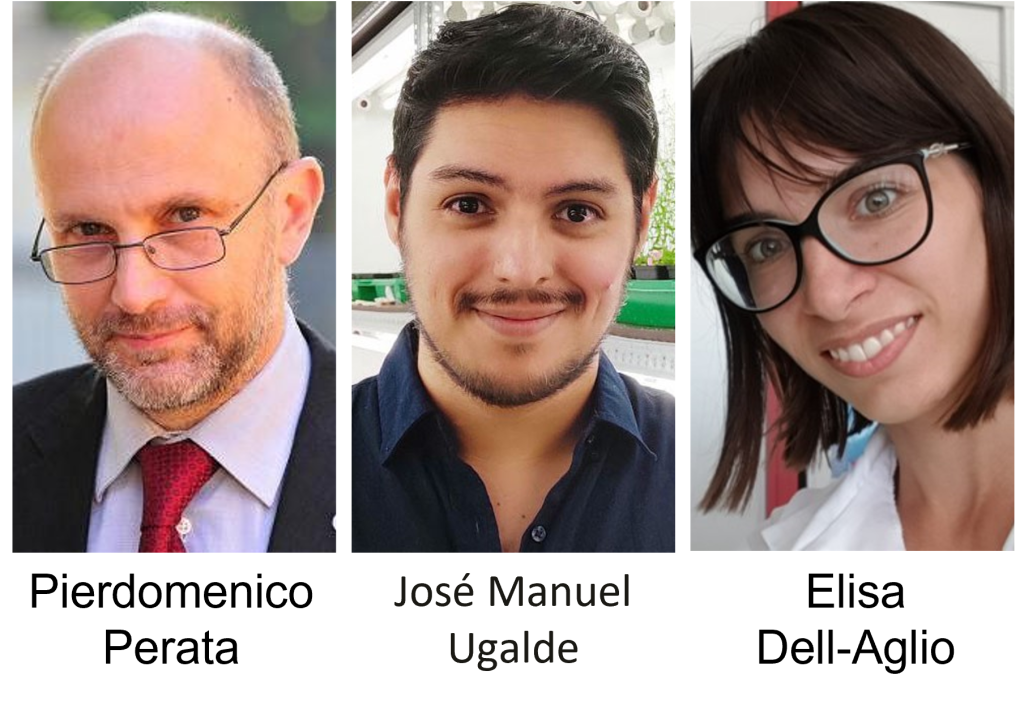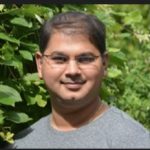An Interview with Pierdomenico Perata, PhD, Monitoring Editor of Plant Physiology
By José Manuel Ugalde, PhD, Plant Physiology Assistant Features Editor, and Elisa Dell’Aglio, PhD
 Prof. Pierdomenico Perata is an Italian plant physologist and professor at the Scuola Superiore Sant’Anna, Pisa. He completed his PhD in agricultural biology at the University of Pisa, Italy, and a post-doctoral fellowship at Nagoya University in Japan. Between 2013 and 2019 he was the Rector of the Scuola Superiore Sant’Anna in Pisa. His research interests include plant hypoxia signaling, sugar sensing, and exogenous RNA signaling.
Prof. Pierdomenico Perata is an Italian plant physologist and professor at the Scuola Superiore Sant’Anna, Pisa. He completed his PhD in agricultural biology at the University of Pisa, Italy, and a post-doctoral fellowship at Nagoya University in Japan. Between 2013 and 2019 he was the Rector of the Scuola Superiore Sant’Anna in Pisa. His research interests include plant hypoxia signaling, sugar sensing, and exogenous RNA signaling.
In this interview, we talk with Pierdomenico about the strategy to keep a fresh, bias-free mind, his experience being a postdoc in Japan, and his views on the common mistakes made by authors and reviewers upon developing a manuscript.
José: How did your interest in plant science start?
Pierdomenico: I can’t tell you really why, but I started being interested in plants when I was in high school. I started growing orchids, which were fascinating and peculiar plants to me, and they are still fascinating for me until today. I am an orchid grower and collector. At that time, it was a hobby, but then, I decided that I wanted to know more about plants, flowers, diversity, and their ability to germinate and grow, which set the direction for my studies.
J: How did you start as a researcher?
P: I wanted to start doing laboratory work early, so I started my bachelors thesis as soon as possible. I was proposed to work on a project about hypoxia. Initially, I was not particularly interested in the topic, but looking back it was the right choice. That was when I fell in love with research. I found it fascinating and challenging to observe the data, try to explain its meaning, and figure out how and why the plant “decided” to behave in a certain way. This pushed me to keep working in the lab and I understood that science is mostly observing anomalies. Research starts with a hypothesis, but in my opinion, you are lucky when you find a result that does not match the original idea, if you can find an alternative hypothesis, of course, which is better than the initial one.
I always enjoyed interpreting the data trying to build a better hypothesis and designing new and better experiments to progress in understanding the original questions. Sometimes people say it is all too frustrating. But the often-experienced frustration was compensated by the rare events of success.
J: Has your research focus shifted over time?
P: Yes. It did many times. I think it’s important because you have your main research topic in which, over decades, you become an expert. But, as a drawback, you tend to think that everything is already known, and you are not very flexible in accepting new hypotheses. So, from time to time, changing a little bit of research topic allows me to start working on something relatively new with a fresh mind. It is challenging because you know little about the subject, but at the same time, you do experiments that probably others would discard, thinking that they would never work. While if you are a bit naive, you perform your experiments without worrying that they might unlikely be successful.
In the past, I started working on sugar sensing, then on anthocyanin synthesis, and most recently on exogenous microRNAs, a topic on which we have a recent paper that is an example of this (Betti et al., 2021). Since we were not prominent experts on the subject, we had a clean blackboard in front of us and not one already filled with notions and no ledger. That is why young people are usually better at developing new hypotheses. It helps to be a bit naive and not blocked by pre-existing knowledge. They are less influenced by the idea that the experiment was obvious and probably already done. In the end, probably nobody has done the experiment, and it was not evident at all. It was simply a good idea. Young people are essential in science because their brain is not full of information that is believed to be unchangeable.
Elisa: That reminds me of a Neil Gaiman quote: “If you don’t know it’s impossible, it’s easier to do.” Without any bias.
P: Yes, the correct word is bias. Often, seasoned scientists develop a lot of experience and become biased, while younger people have less knowledge, but they are less biased. So, the trick for older people like me is to change subjects from time to time. Therefore, you know less and develop your experiments in an unbiased way. You can produce something that is not just incrementally new, but is really innovative. Incremental science is important, but a breakthrough is more exciting.
J: Is there a breakthrough from your career you would like to share with us?
P: The last one for sure. We discovered that plants can modulate each other’s gene expression by exchanging microRNAs through root exudates, which is something that I keep thinking is quite unbelievable. The amount of these molecules needed to trigger an effect is minimal, meaning that there is an amplification mechanism inside the plant, which we described (Betti et al., 2021). We were worried when we submitted the paper. Of course, we thought we might have overlooked something because we are not actual experts in the field. Eventually, the reviewers were tough, but they were convinced by the amount of data we produced.
E: What was the best moment you remember or a situation that changed your perspective?
P: Well, I did my postdoc in Japan. And that was a very interesting period from many points of view. Of course, it is a very diverse country from a cultural point of view. I had the opportunity to start something new and work on sugar sensing where, in the end, I managed to publish a good paper. It was very exciting, but also quite stressful. When you are a postdoc abroad, you have fixed time constraints and it will be complicated to complete the experiments once your contract is over. I rejoiced when my paper was accepted one week before going home!
J: Do you have a piece of knowledge that you would like to have had at the beginning of your career?
P: Finding a supervisor that is a good mentor for your needs. My greatest luck was finding a supervisor who left me doing exactly what I wanted. Creative students should be let free to explore. But not all students are the same. Some students need advice daily, others weekly, and some need advice every other month. It is very important to understand the personality and needs of each student and the mentor should adapt to this.
E: From the student’s perspective, do you have any advice to find a good supervisor?
P: Very big laboratories are risky because your supervisor might not have enough time for you, and you might be neglected. Also, choose a lab where the supervisor is not too close to retirement because they might be less engaged in research. And choosing a lab where the supervisor is very young is a risk as well. Don’t be afraid of small, new groups: if the topic interests you and you have a good feeling, it might be an exciting experience. And don’t forget money: you need to find a lab that is well funded. Without funds, it’s tough to do good science even if you have good ideas. It is important as well to look for a friendly working environment that avoids competition within the lab. I always try to keep students who can get along with each other well because if the environment is bad, this impacts everyone’s productivity.
E: Related to your work as an editor for Plant Physiology, is there a common mistake that bothers you when you handle or review a paper?
P: The common mistake I see in reviewers is to suggest too many additional experiments. In the editorial work of a journal, I always think that the journals should not be part of the making of a paper. They should evaluate the paper, which is different from suggesting experiments. If an article is not good enough, it should be rejected, rather than say, “if you spend an extra 8 months working and you do this piece, we might reevaluate your manuscript.” I am not really in favor of this. If it is minor editing or a refinement experiment, it’s OK, but if it is redoing one-third of the paper because the editor or the reviewer had a different point of view, I don’t like this.
E: What makes you think that the paper is valuable?
P: When the message is clear. If you have a good story, you should be able to come up with a good title. The title should be enough to know the content of your paper. If the title of the article is hard to understand, then I already feel that the story is incomplete. Of course, getting this from the title alone might be a bit extreme, but by reading the abstract, you should understand how important and challenging the question was and how well the authors could answer the question. Another good aspect is when you can “read” the paper with the figures alone. It is probably a good paper if you can go through the figures and understand the story. The figures would be a logically connected sequence of experiments. Therefore, by understanding the first experiment or figure, you understand the second, the third, and so on. The best is to make a model at the end of the paper. It isn’t easy to draw a model if you don’t have a clear story.
About the Authors
José Manuel Ugalde completed his PhD in molecular genetics and microbiology at Pontificia Universidad Católica de Chile in 2018 under the supervision of Prof. Loreto Holuigue. He followed a postdoc position at the University of Bonn, Germany with Prof. Andreas J. Meyer, working in the Chemical Signalling lab. José is working with genetically encoded fluorescent sensors as tools to “shed light” on different aspects of plant thiol redox biology, recently focused on the dissection of endoplasmic reticulum redox dynamics in vivo. He is a Plant Physiology Assistant Features Editor for the 2022-2023 period.
Elisa Dell’Aglio obtained her PhD in plant biochemistry at the University of Grenoble in 2013. Her eclectic career spanned plant responses to infectious bacteria, the regulation of vitamin B6 biosynthesis in response to stress, nutritional stress in cereal weevils, and interkingdom communication via small RNAs. In September 2022, she will join the University of Milan to work on long distance calcium and NADP signaling in plants in response to pathogens. She was Plant Physiology Assistant Features Editor in 2020 and 2021.
Read more interviews of Plant Physiology editors here.



